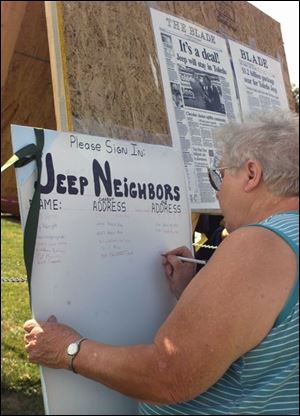
Ex-residents mark eviction for Jeep plant
7/25/2002
Displaced neighbor Pat Bensen signs in at the outset of the reunion held near the plant.
Three generations of Elen Czapczynski's family have lived at 3724 Stickney Ave. over the course of 46 years.
“I watched my granddaughters in that house,” said Mrs. Czapczynski, 79. “[The city] has taken a lot away from me.”
Landscaped lawns now occupy the space where Mrs. Czapczynski's house once stood. She is one of 83 homeowners and 16 businesses the city removed by eminent domain in the late 1990s to make room for the expanded DaimlerChrysler plant.
Mrs. Czapczynski stood drinking a can of soda and commiserating with two dozen other past residents at a “Jeep neighborhood reunion” held yesterday down the street from the plant. Yesterday marked the five-year anniversary of the date they learned their homes would be removed to make way for DaimlerChrysler's construction.
The group gathered across the street from Kim's Auto and Truck Repair, Inc., the last business to hold out against removal. Owners Kim and Herman Blankenship plan to fight the city's claim of eminent domain in court.
“Chrysler thinks Kim's is an eyesore,” said Dyane Skunda,who was forced to move from her house in 1999. “The only reason they want the land is so they can put a big Jeep sign on the fence. They said they want `full view' from the highway - our houses were an eyesore for them.”
Many residents were upset to see their houses were replaced not by DaimlerChrysler facilities, but by open green space around the plant.
Terry Lodge, a local attorney who is representing Kim's Auto and Truck Repair, said the city's transfer of individuals' and small businesses' property to a larger business is a misuse of eminent domain. “Over the years, the concept of eminent domain has moved from condemning land for a genuine public purpose to becoming a tool for redevelopment,” Mr. Lodge said. “This land was already productive - there were 16 businesses and 83 houses. But it wasn't considered profitable enough.”
Mr. Lodge said the plant is not a valid public interest because DaimlerChrysler has cut payrolls since negotiating the deal with the city and has made no commitment to expand production here.
“The decrease in payroll size is proof they don't want to hold a skilled labor force in the area,” he said. “In a time of global recession and overcapacity in the auto industry, I don't see them expanding.”
The lawsuit will be the second filed against the city in regard to land around the plant. The first was filed in 1998 by several area residents and small businesses to protest the constitutionality of tax breaks Toledo granted DaimlerChrysler to encourage plant construction. The case is in the U.S. 6th Circuit Court of Appeals in Cincinnati, where the plaintiffs are appealing a decision that favored the city.
The case has attracted the support of Ralph Nader, consumer advocate and one-time presidential candidate. Mr. Nader has assured residents he will help them take the case to the U.S. Supreme Court, reunion organizer Julie Coyle said.
“This lawsuit is going to end corporate welfare in this country,” Ms. Coyle said.
Those present at the reunion chose the occasion to erect a memorial in front of Kim's Auto and Truck Repair for eight elderly residents who, they claim, died because of “transfer trauma” shortly after removal from their homes.
“The city said we couldn't do it because we don't have a sign permit,” Ms. Coyle said. “We'll see how long it takes them to take it down.”